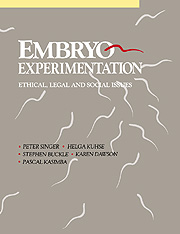Book contents
- Frontmatter
- Contents
- Foreword
- ACKNOWLEDGEMENTS
- INTRODUCTION
- PART 1 THE SCIENTIFIC ISSUES
- PART 2 THE ETHICAL ISSUES
- ARGUMENTS ABOUT THE STATUS OF DIFFERENT DEVELOPMENTAL STAGES
- ARGUMENTS FROM POTENTIAL
- EMBRYO RESEARCH AND WOMEN
- 10 Who is the subject of research?
- 11 Is IVF research a threat to women's autonomy?
- PART 3 CONTROLLING EMBRYO EXPERIMENTATION IN A DEMOCRATIC SOCIETY
- FORMING A PUBLIC POLICY
- LEGISLATION AND ITS PROBLEMS
- APPENDICES
- GLOSSARY
- NOTES ON CONTRIBUTORS
- INDEX
11 - Is IVF research a threat to women's autonomy?
Published online by Cambridge University Press: 05 June 2012
- Frontmatter
- Contents
- Foreword
- ACKNOWLEDGEMENTS
- INTRODUCTION
- PART 1 THE SCIENTIFIC ISSUES
- PART 2 THE ETHICAL ISSUES
- ARGUMENTS ABOUT THE STATUS OF DIFFERENT DEVELOPMENTAL STAGES
- ARGUMENTS FROM POTENTIAL
- EMBRYO RESEARCH AND WOMEN
- 10 Who is the subject of research?
- 11 Is IVF research a threat to women's autonomy?
- PART 3 CONTROLLING EMBRYO EXPERIMENTATION IN A DEMOCRATIC SOCIETY
- FORMING A PUBLIC POLICY
- LEGISLATION AND ITS PROBLEMS
- APPENDICES
- GLOSSARY
- NOTES ON CONTRIBUTORS
- INDEX
Summary
Many of the moral objections to in vitro fertilization and to research on human pre-embryos are based upon beliefs about the moral status of the preembryo itself. I shall consider a different moral objection to the experimental production and use of IVF pre-embryos, an objection based not on the supposed rights of pre-embryos, but on those of the persons from whom they originate. This objection is central to a number of feminist critiques of the new reproductive technologies. It is that women, in particular, do not freely choose to be subjects or donors in IVF and other reproductive research. Women's ‘choices’ about the new reproductive technologies, it is argued, are controlled by coercive social pressures, and thus are neither free nor autonomous. If women cannot autonomously choose or refuse to be experimental subjects or donors to reproductive research, then their participation in such research cannot be viewed as an exercise of their medical/reproductive rights. Nor can it easily be defended as in their own best interests, since most women who serve as subjects or donors are not greatly benefited, and some are subjected to significant medical risks.
Medical professionals respond to this objection by pointing to the practice of obtaining patients' ‘informed consent’ for medical treatment or research. Today, at least in much of the world, physicians and researchers are required by law and/or institutional policy to obtain the consent of any person whose gametes or pre-embryos are used in medical or reproductive research.
- Type
- Chapter
- Information
- Embryo Experimentation , pp. 125 - 140Publisher: Cambridge University PressPrint publication year: 1990
- 3
- Cited by



